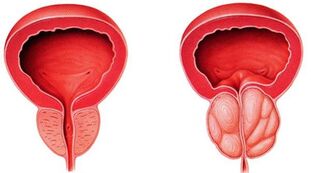Prostatitis and its treatment is one of the most painful topics in men suffering from this disease. The treatment of prostatitis, according to experts, is a process consisting of many completely different procedures: physiotherapy, medication, massage. Only the overall impact on the problem can help eliminate the unpleasant symptoms and most importantly the cause of the disease. The main role in this is assigned to drugs in the form of tablets, injections and suppositories.

Medicines for the treatment of prostatitis are chosen by the attending physician. The set of means depends on what form of the disease the patient has. Also, the type of infection that caused the inflammation of the prostate plays an important role. All doctors pay attention to these two factors in the first place. What else can influence the choice of drugs? We'll talk about that later. But first, let's try to understand what problems men have with prostatitis and what they have to deal with.
How do we know it's prostatitis?
Prostatitis treatment cannot be started without patient complaints. What signs may indicate that the man is ill with this? Experts agree that the initial stage of the disease may not appear at all. Weakness and fatigue, which appear at the beginning of the disease, are often confused by men with ordinary fatigue, vitamin deficiency and stress. And only when the inflammation covers the entire prostate can they notice pain above the pubis radiating to the rectum, difficulty urinating and a constant urge to use the toilet. It is with such complaints that patients most often go to clinics. At this stage of the disease, treatment of prostatitis with pills gives good results. The risk of becoming chronic is minimal.
However, about 25% of men with symptoms of prostatitis are in no hurry to see a doctor and endure. In this case, the complaints are much more serious. In addition to constant pulling pains, men complain of reduced potency, lack of erection or too rapid ejaculation. Fibers, scales and blood inclusions are visually observed in the urine of such patients. The treatment of prostatitis at this stage is a very complex process.

It is almost impossible to deal with the disease with pills alone. In addition, the risk of complications, such as calculous prostatitis, increases significantly.
Causes of prostatitis
What can cause prostatitis in men? Treatment (medication) begins with asking this question. Ultimately, it is the diagnosis that helps to choose the right medication for each case. Young men most often fall victim to prostatitis, which has developed as a result of genital infections that they have suffered: herpes, candidiasis, chlamydia, cytomegalovirus, trichomoniasis and others. Inflammation of the prostate gland also develops as a result of regular hypothermia or congestion in the pelvis due to a sedentary lifestyle.
In mature men, prostatitis most often occurs as a result of inflammatory diseases of the internal organs, stress, purulent-inflammatory processes on the skin, as well as after influenza or other viral infections.
Elderly patients begin to suffer from prostatitis due to prolonged sexual abstinence. In addition, reduced immunity and chronic inflammatory processes of the internal organs can be the cause of their disease.
Based on these statistics, as well as from laboratory and instrumental studies, the doctor chooses drugs to treat prostatitis.
Method of treatment
There are several important aspects in the medical treatment of pathology. All of them are aimed at restoring prostate tissue, eliminating inflammation and fighting the microorganisms that caused the disease. Symptomatic treatment of prostatitis in men is also important. Medications in this case relieve pain and cramps.
Elimination of symptoms is not the most important thing in the treatment of prostate inflammation. Antimicrobial and antiviral drugs to treat prostatitis are much more important. Their selection is made according to the results of laboratory tests. In this case, not only the type of pathogen is taken into account, but also the sensitivity of the patient's body to drugs.
What else is needed to remove prostatitis in men? Treatment (medication) must include medication that restores immune status. This allows the patient's body to fight the infection on its own. In addition, attention is paid to the restoration of potency (if there are problems with it).
Treatment methods such as prostate massage, herbal medicine and special nutrition also contribute to the restoration of prostate function.
Types and forms of drugs for prostatitis
So, we figured out which treatments are considered the most effective today. As drugs for the treatment of prostatitis are considered the main measure to combat the disease, it is worth considering in more detail which forms are most commonly used:
- Antibiotics and antiviral drugs - in the form of tablets, rectal suppositories and injections.
- Alpha-1-blockers - in the form of tablets or capsules.
- Hormonal preparations for the treatment of prostatitis and prostate adenoma - in the form of tablets.
- 5-alpha reductase inhibitors - tablets or capsules.
- Phytopreparations - in the form of tablets, capsules filled with powder or dragees.
- Non-steroidal anti-inflammatory drugs - in the form of tablets or solution for injection.
The doctor, after a thorough examination of the patient, decides how to treat prostatitis: with pills, injections and / or suppositories.

What medications are most commonly used when a man is diagnosed with prostatitis? The names of many drugs mean nothing to most patients, and single ads tell of 2-3 drugs that can help fight prostatitis. We will then look at each group of drugs for this disease in more detail.
Anti-inflammatory drugs (NSAIDs)
Prostatitis medications in this group are designed to relieve pain and inflammation. They can also lower body temperature in acute prostatitis. The most suitable drugs are:
- Rectal suppositories and injections of diclofenac sodium.
- Ketorolac trometamol tablets and solution for injection.
Both drugs have contraindications. In general, their intake affects the digestive system of patients, which is why in most cases the treatment regimen is a three-day course with a weekly interval between them. But the drug "Ketorolac" is recommended for single use in pain of high intensity.
Antibiotics and antiviral drugs for prostatitis
Antibiotics and antivirals are completely new drugs for the treatment of prostatitis. The fact is that penicillin and similar substances are not able to penetrate enough through the prostate barrier and accumulate in the tissues of the gland. Therefore, antibiotics known for a long time are not effective enough. What medications can be taken for inflammation of the prostate? Here is a list of them:
- Tablets and injections, which belong to the subgroup of protected amoxicillins and are effective in acute and chronic prostatitis.
- Injectable solutions of Cefotaxime, Ceftazidime or Ceftriaxone. Although very effective, these antibiotics have virtually no side effects.
- Macrolide-related tablets and injections of Azithromycin and Josamycin. With their help you can fight against microorganisms inside the cells of the diseased organ, ie the prostate. Norfloxacin, ofloxacin or ciprofloxacin tablets and capsules. In addition to antimicrobial action, they produce an immunomodulatory effect. Ciprofloxacin and acyclovir tablets are prescribed to patients who have a viral infection that causes inflammation of the prostate.

So, we have listed the main drugs used to treat prostatitis in men. Medicines should be selected and prescribed only by a specialist!
Immunosuppressants
Every inflammatory process, including prostatitis, takes place against a background of reduced immunity. That is why it is important to take immunomodulators. The most effective in prostatitis are:
- interferon alpha and tactivin tablets, protecting against foreign microorganisms; <-xli>T-lymphocyte stimulator Levamisole;
- tablets containing sodium nucleinate, which increase the activity of macrophage cells;
- drugs methyluracil and dried juice of the herb Echinacea purpurea, stimulating cellular immunity.
All of the above medications are prescribed by your doctor. It also calculates the required dose and duration of administration. It is not recommended to take them alone!
Herbal medicines for prostatitis
Despite the abundance of synthetic drugs, the treatment of prostatitis takes less time with regular intake of special herbal medicines.
Urinary normalizers
Drugs in this group are mainly used for chronic prostatitis. It is this form of the disease that suggests problems with urination. As a rule, alpha-1 blockers help relieve swelling of the prostate tissue.
The most popular drugs for prostatitis
At present, physicians specializing in the treatment of male diseases, including prostatitis, prefer to prescribe complex drugs to patients who combine several properties simultaneously. For example, the solution for injection of prostate extract is effective in both acute and chronic prostatitis. Its use helps to activate the immune system, strengthen the vascular and cell walls in the prostate. As a result of therapy with the use of this drug, blood circulation in the pelvic organs is normalized, the recovery of prostate tissue occurs several times faster. Also, drugs are often used to treat chronic prostatitis in the form of rectal suppositories.Should I take hormones for prostatitis?
Hormonal preparations for prostatitis in acute and chronic forms are not used. The only condition under which a doctor may prescribe hormone-containing drugs is the presence of a benign or malignant tumor in the prostate gland.
In conclusion, I would like to remind readers once again that all the medications mentioned in this article are prescribed by your doctor. Self-administration of drugs can lead to unpredictable consequences.
























